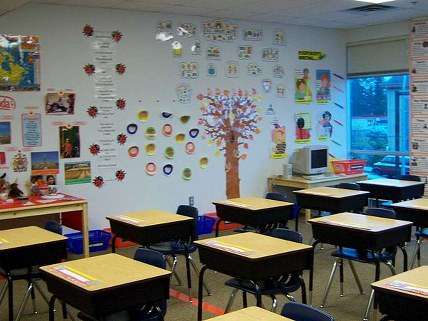The Old-School Empire Strikes Back

School choice has been winning some battles in recent years. But just after the close of a week celebrating gains in expanding education options for families, old-school (in the literal sense) defenders of one-size-fits-all learning push back in two of the country's more … umm … authoritarian jurisdictions. Newly minted New York City Mayor Bill de Blasio wants to gut funding for privately managed charter schools that offer myriad approaches and philosophies, while Illinois lawmakers look to weaken a state commission that has the power to authorize charters over the objection of entrenched local school districts.
According to the editorial board at the New York Post:
On Friday, Mayor Bill and Schools Chancellor Carmen Fariña announced that they plan to redirect $210 million away from charter public schools to traditional public schools. The funds will come from the 2015-19 capital plan, which hasn't been released. Basically, what this means is that money that would've gone for the expansion of successful charter schools will go to build more pre-kindergarten seats at the traditional public schools.
This is astonishing on several scores. To begin with, the best research we have suggests the returns on most pre-K programs diminish after a few years, while the charter gains are impressive. If you were going to help children get a decent education, where would you put your dollars?
Even before his election, Bill de Blasio had a reputation as a defender of state-controlled everything (including horses). As the Post notes, research on charter schools has generally shown encouraging educational outcomes for children when compared to traditional public schools. That's especially impressive when you consider that charters tend to attract families that have been sorely disappointed by the often cookie-cutter traditional schools.
But even if the research didn't show such impressive outcomes, there's value in choice in and of itself. It allows families to pick and choose among philosophies and environments that best suit their own children and don't treat them as identical products with uniform needs.
Likewise, the Chicago Tribune's editorial board warns:
Illinois lawmakers created a special board in 2011 to encourage education choice. The Illinois State Charter School Commission has the power to override local school districts that reject efforts to open innovative public schools in their communities.
We strongly backed the creation of the commission because Illinois needs more top-performing charter schools. The idea did not drum up much controversy. The Illinois House and Senate cast overwhelming votes in favor of the commission. But there's already a move to scrap it.
That move is being led by state Rep. Linda Chapa LaVia and Sen. Kimberly Lightford, who voted just a couple of years ago to create the commission.
Chapa LaVia has filed another bill that would preserve the commission, but allow voters to overturn a decision of the commission by referendum.
The big problem, from lawmakers' perspective, is that the commission actually seems to like charter schools, while the local districts it overrules to authorize charters almost always don't. Also, politics may have played into some of the commission's decisions—a not entirely unknown phenomenon in the state of Illinois, and one that's likely inevitable in any activity involving government bodies doling out permissions and funds. The school districts do the same, but they do so with the approval of pet legislators.
The result in both New York and Illinois is a threat to one of the more popular and fast growing education options.
That's not to say the news is all bad. North Carolina introduced vouchers to help low-income students attend private schools, despite lawsuits. Wisconsin has done the same, while Indiana expanded its voucher program to nearly 20,000 students.
But there's no doubt that, in some parts of the country, fans of old-line, state-dominated education are starting to push back, and making efforts to limit the options available. If they win any of their battles, that's bound to hurt some families and students.
